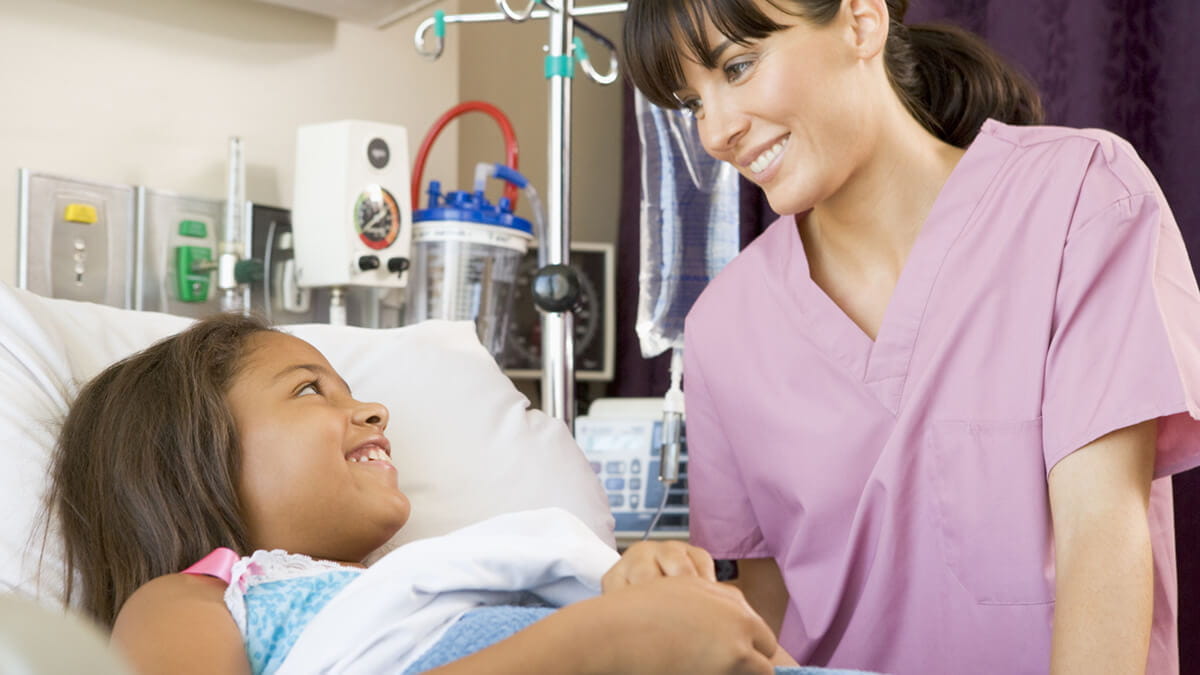Part of being a great nurse is being a great communicator. After all, good communication is essential for improving health outcomes and patient satisfaction. In nursing school, students learn that they need solid communication skills to effectively relay information to patients and collaborate with the rest of the healthcare team. As with any skill, communication improves with practice, but it’s not without its challenges.
In nursing school, students learn so many medical terms that it almost becomes a separate language—often referred to as medicalese. While this can be helpful when communicating with doctors and other members of the healthcare team, it can be very confusing for patients and their families. During medical situations, patients and their loved ones are often nervous, stressed, or shocked; can be frightened or in pain; and may even be on medication that could make it difficult to understand not only what is happening, but what the nurse is saying. Being able to translate the medicalese so that everyone can understand is part of providing great nursing care.
Medical terminology aside, nurses may also need to communicate with patients and families who speak a different language. Though some hospitals have dedicated translators, translation services can sometimes overcomplicate situations that are already stressful. It can be helpful for nurses to learn a language that is common to the community in which they work, or some terms and phrases that can bridge communication gaps at critical times.
Another challenge nurses encounter is communicating with doctors and healthcare teams. The rise of electronic medical records has resulted in a decrease in informal communication among the members of a healthcare team, which means certain important patient information may not be shared. Though electronic medical records help address handwriting issues and spelling errors that can greatly affect patient care, the team still needs to connect with each other in a meaningful way—even during extremely busy shifts.
Communication Reminders Throughout Your Nursing Career
Communication skills can be developed and refined in nursing school, as well as throughout your nursing career. Here are a few tips to remember:
- Speak clearly, slowly, and audibly. Nursing is a job that requires multitasking, but it’s important to stop and communicate. Some words can sound similar but mean very different things, so be sure you’re speaking clearly and not rushing your words. Speak at an appropriate volume to be heard accurately.
- Choose your words. Complicated medical terms or unfamiliar words aren’t always helpful. Explain complex information using words patients can understand to ensure the intended message is received.
- Be a good listener. Half of communication is listening. Nurses need to listen to patients, doctors, and other members of the healthcare team to ensure a satisfactory response.
- Ask follow-up questions. After you’ve given some instructions or the doctor has delivered some news, ask if the patient understood what was said. The patient may not have fully understood, so pausing to help them make sense of it will improve patient outcomes and satisfaction.
- Be cognizant of your nonverbal communication. Nonverbal communication—such as your facial expressions, gestures, and posture—should match your verbal communication. Be aware these other cues may deliver a different message than what you’re telling your audience.
Whether you’re a seasoned nurse with a Master of Science in Nursing (MSN) degree or a registered nurse (RN) considering earning a Bachelor of Science in Nursing (BSN), there are countless opportunities to improve your communication skills in school and on the job. Consider earning a nursing degree online through a program where a critical competency is honing effective communication skills. Walden University offers online nursing degree programs, including a Bachelor of Science in Nursing (RN-BSN) Completion Program and Master of Science in Nursing (MSN), that are accredited by the Commission on Collegiate Nursing Education (CCNE).
Walden University is an accredited institution offering online nursing programs at the bachelor’s, master’s, post-master's certificate, and doctoral levels. Expand your career options and earn your degree using a convenient, flexible learning platform that fits your busy life.
The baccalaureate degree program in nursing (BSN), master’s degree program in nursing (MSN), and Doctor of Nursing Practice (DNP) program at Walden University are accredited by the Commission on Collegiate Nursing Education (www.ccneaccreditation.org).
Officially recognized by the U.S. Secretary of Education as a national accreditation agency, CCNE is an autonomous accrediting agency contributing to the improvement of the public's health. CCNE ensures the quality and integrity of baccalaureate, graduate, and residency programs in nursing.
Walden University is accredited by the Higher Learning Commission www.hlcommission.org.




